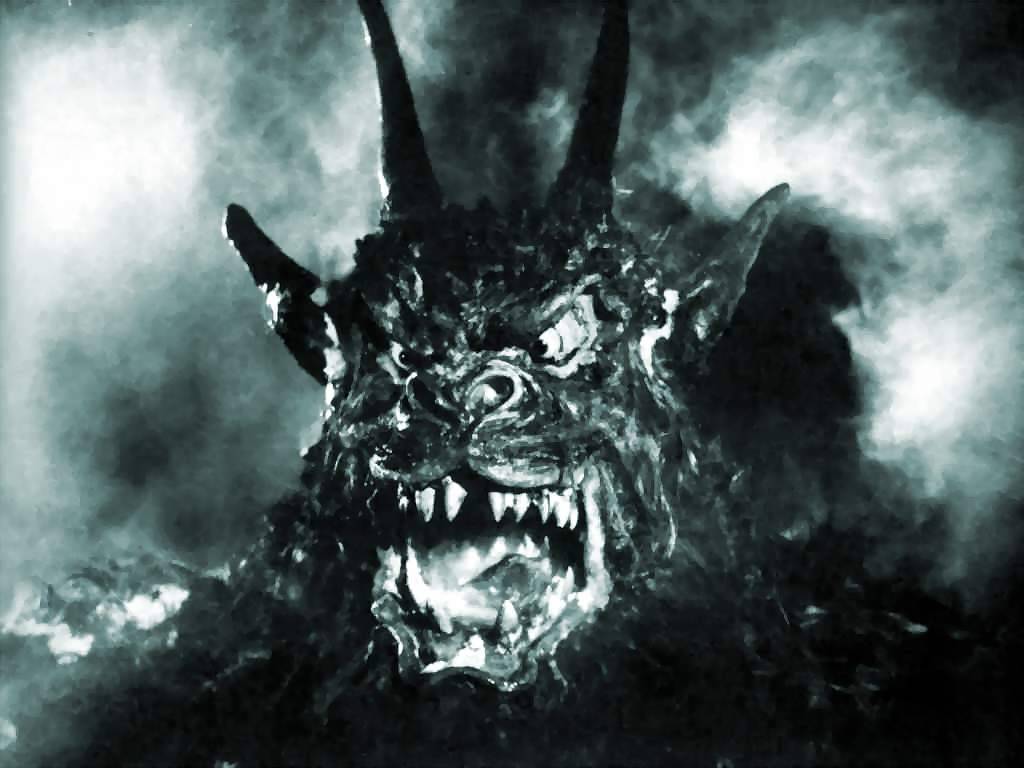|

|
Belial (also Belhor, Baalial, Beliar,
Belias , Beliall, Beliel, Bilael, Belu; from
Hebrew,
also named
Matanbuchus, Mechembuchus, Meterbuchus in older scripts) is
one of the four crown princes of Hell and a demon in the Bible, Christian apocrypha, and Jewish apocrypha. It
is also a term used to characterize or embody the immensely wicked or
iniquitous.
The etymology of the word is
uncertain, but is most commonly translated as "without worth". Some scholars
translate it from Hebrew as "worthless" (Beli yo'il), while others translate it
as "yokeless" (Beli ol), "may have no rising" (Belial) or "never to rise" (Beli
ya'al). Only a few etymologists have assumed it to be a proper name from the
start. In the Book of Jubilees, uncircumcised heathens are called
"sons of Belial". Also appearing in some Muslim scripture, the demon is said to
have feasted on the poor and fed the rich with the regurgitated remains. When
the rich denied his service, he was sent back into the underworld to serve Satan
himself.
In the New Testament
the word is used to refer to a demon, or maybe Satan or Lucifer, when asked by St. Paul as to how Christ and Belial can agree. The passage in the Bible
NIV states: "What harmony is there between Christ and Belial? What does a
believer have in common with an unbeliever?".
Since the Middle Ages he
has been considered to be a powerful king of Hell that gives excellent familiars to his followers. As a demon he was
said to have an agreeable aspect, and to induce to any type of sins, especially
those related to sex, lust and gluttony. Sebastien Michaelis states that Belial
seduces by means of arrogance and his adversary is St. Francis of Paola; in this sense his name
is translated as "Lord of Arrogance" or "Lord of Pride" (Baal ial).
In the Biblia Vulgata fewer allusions to this demon are
made, referring to Belial as torrents of death, and to impious men as
sons of Belial and men of Belial.
Belial is listed as the sixty-eighth spirit of the The
Lesser Key of Solomon.
(Be′li·al) [from Heb., meaning “Good for Nothing”; a compound of beli′, “not,
without,” and ya·‛al′, “be of benefit; be beneficial”].
The quality or state of being useless, base, good for nothing. The Hebrew
term beli·ya′‛al is applied to ideas, words, and counsel,
to calamitous circumstances, and most
frequently, to good-for-nothing men of the lowest sort—for example, men who
would induce worship of other gods; those of Benjamin
who committed the sex crime at Gibeah; the wicked sons of
Eli; insolent
Nabal; opposers of God’s
anointed, David; Rehoboam’s
unsteady associates; Jezebel’s
conspirators against Naboth; and men in general
who stir up contention. Indicating that
the enemy power would no longer interfere with the carrying out of true worship
by his people in their land, Jehovah declared through his prophet: “No more will
any good-for-nothing person pass again through you. In his entirety he will
certainly be cut off.”
By the time Bible writing resumed in the first century, “Belial” was used as
a name for Satan. So when Paul wrote in his series of
parallel contrasts, “What harmony is there between Christ and Belial?” the
conclusion usually drawn is that “Belial” is Satan. The Syriac Peshitta here
reads “Satan.”
|
 Copyright(c) 2007
- 2020 All rights reserved. Copyright(c) 2007
- 2020 All rights reserved.
|

![]() Copyright(c) 2007
- 2020 All rights reserved.
Copyright(c) 2007
- 2020 All rights reserved.